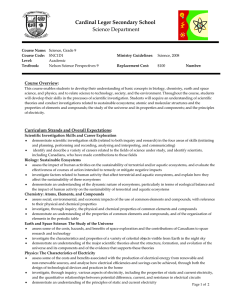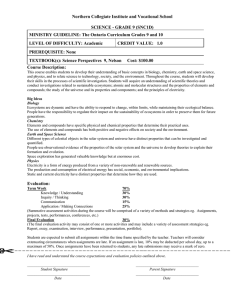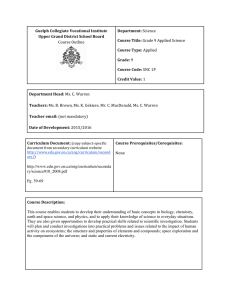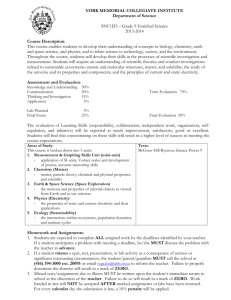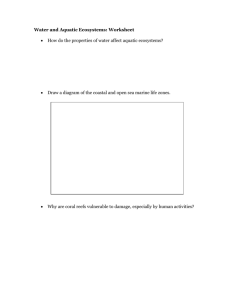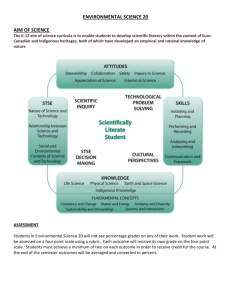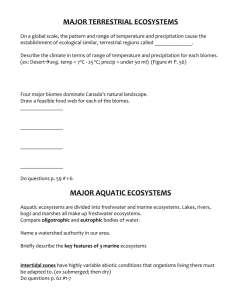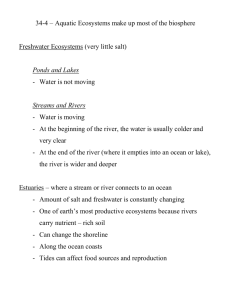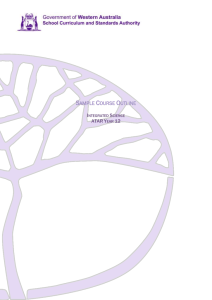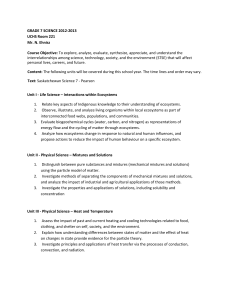SNC 1D1 - Holy Cross Catholic Academy
advertisement
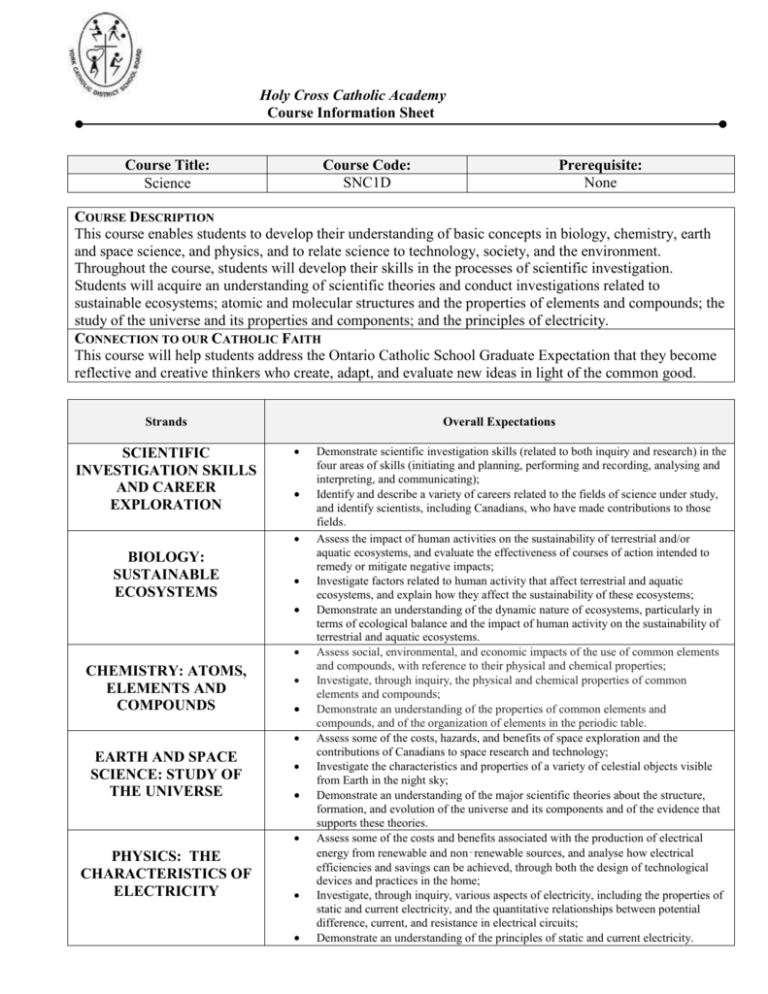
Holy Cross Catholic Academy Course Information Sheet Course Title: Science Course Code: SNC1D Prerequisite: None COURSE DESCRIPTION This course enables students to develop their understanding of basic concepts in biology, chemistry, earth and space science, and physics, and to relate science to technology, society, and the environment. Throughout the course, students will develop their skills in the processes of scientific investigation. Students will acquire an understanding of scientific theories and conduct investigations related to sustainable ecosystems; atomic and molecular structures and the properties of elements and compounds; the study of the universe and its properties and components; and the principles of electricity. CONNECTION TO OUR CATHOLIC FAITH This course will help students address the Ontario Catholic School Graduate Expectation that they become reflective and creative thinkers who create, adapt, and evaluate new ideas in light of the common good. Strands SCIENTIFIC INVESTIGATION SKILLS AND CAREER EXPLORATION Overall Expectations BIOLOGY: SUSTAINABLE ECOSYSTEMS CHEMISTRY: ATOMS, ELEMENTS AND COMPOUNDS EARTH AND SPACE SCIENCE: STUDY OF THE UNIVERSE PHYSICS: THE CHARACTERISTICS OF ELECTRICITY Demonstrate scientific investigation skills (related to both inquiry and research) in the four areas of skills (initiating and planning, performing and recording, analysing and interpreting, and communicating); Identify and describe a variety of careers related to the fields of science under study, and identify scientists, including Canadians, who have made contributions to those fields. Assess the impact of human activities on the sustainability of terrestrial and/or aquatic ecosystems, and evaluate the effectiveness of courses of action intended to remedy or mitigate negative impacts; Investigate factors related to human activity that affect terrestrial and aquatic ecosystems, and explain how they affect the sustainability of these ecosystems; Demonstrate an understanding of the dynamic nature of ecosystems, particularly in terms of ecological balance and the impact of human activity on the sustainability of terrestrial and aquatic ecosystems. Assess social, environmental, and economic impacts of the use of common elements and compounds, with reference to their physical and chemical properties; Investigate, through inquiry, the physical and chemical properties of common elements and compounds; Demonstrate an understanding of the properties of common elements and compounds, and of the organization of elements in the periodic table. Assess some of the costs, hazards, and benefits of space exploration and the contributions of Canadians to space research and technology; Investigate the characteristics and properties of a variety of celestial objects visible from Earth in the night sky; Demonstrate an understanding of the major scientific theories about the structure, formation, and evolution of the universe and its components and of the evidence that supports these theories. Assess some of the costs and benefits associated with the production of electrical energy from renewable and non‑renewable sources, and analyse how electrical efficiencies and savings can be achieved, through both the design of technological devices and practices in the home; Investigate, through inquiry, various aspects of electricity, including the properties of static and current electricity, and the quantitative relationships between potential difference, current, and resistance in electrical circuits; Demonstrate an understanding of the principles of static and current electricity. Units and Timelines Unit Title Approximate Time BIOLOGY: Sustainable Ecosystems 15 lessons CHEMISTRY: Atoms, Elements and Compounds 24 lessons EARTH AND SPACE SCIENCE: Study of the Universe 9 lessons PHYSICS: The Characteristics of Electricity 24 lessons Instructional strategies: modeled, shared and guided instruction, cooperative group learning, accountable talk, independent application and consolidation, experiential learning, inquiry-based learning, robust thinking (critical analysis and reflection). Assessment and Evaluation Breakdown CATEGORIES 100% Knowledge/Understanding 25% TERM 70% FINAL 30% Thinking 20% Communication 10% Application 15 % Assessment and Evaluation Strategies: classroom presentations, conferences, essays, response journals, demonstrations, interviews, learning logs, quizzes, tests, and exams, observations, performance tasks, portfolios, question and answers, self-assessment. Assessment and Evaluation Tools: Checklists, exemplars, rating scales, rubrics, metacognition, self and peer assessment, anecdotal notes. Focus on Learning Skills Responsibility Organization Fulfils responsibilities and commitments within the learning environment. Completes and submits class work, homework, and assignments according to agreed-upon timelines. Takes responsibility for and manages own behaviour. Devises and follows a plan and process for completing work and tasks. Establishes priorities and manages time to complete tasks and achieve goals. Identifies, gathers, evaluates, and uses information, technology, and resources to complete tasks. Independent Work Independently monitors, assesses, and revises plans to complete tasks and meet goals. Uses class time appropriately to complete tasks. Follows instructions with minimal supervision. Collaboration Initiative Accepts various roles Looks for and and an equitable share of acts on new ideas work in a group and opportunities Responds positively to for learning. the ideas, opinions, Demonstrates values, and traditions of the capacity for others. innovation and a Builds healthy peerwillingness to to-peer relationships take risks. through personal and Demonstrates media-assisted curiosity and interactions. interest in Works with others to learning. resolve conflicts and Approaches build consensus to new tasks with a achieve group goals. positive attitude. Shares information, Recognizes resources, and expertise, and advocates and promotes critical appropriately for thinking to solve problems andthe make rights of self decisions. and others Self-Regulation Sets own individual goals and monitors progress towards achieving them. Seeks clarification or assistance when needed. Assesses and reflects critically on own strengths, needs, and interests. Identifies learning opportunities, choices, and strategies to meet personal needs and achieve goals. Perseveres and makes an effort when responding to challenges. N.B. Additional Information Found in Student’s School Agenda/Board Policy: Lates, Absences and Missed Assignments follow the YCDSB Assessment & Evaluation Guidelines, in compliance with the Ministry of Education Policy on Assessment, Evaluation and Reporting. Student Fees: In accordance with Board Policy 601, there are no course fees for basic course materials (e.g. textbooks, workbooks, handouts). Some courses may offer enhancements (e.g. field trips, musical instruments, activities) for which there maybe a fee. Board Policy 601 is available on the board website at www.ycdsb.ca. Title of Textbook: Nelson Science Perspectives 9_ Name of Teacher: ________________________________________ Student Signature Replacement Cost: $100 _______________________________________ Parent/Guardian Signature
